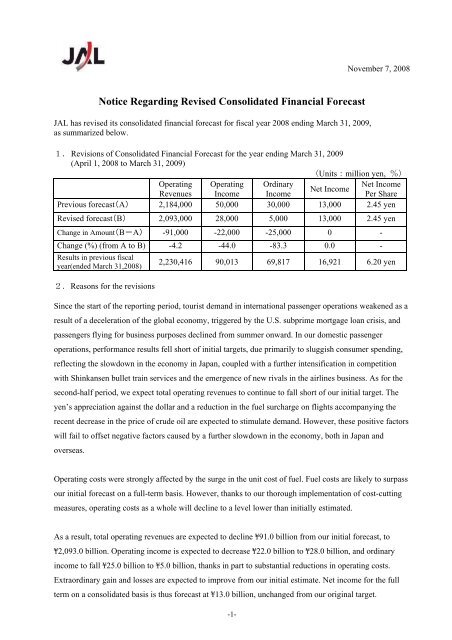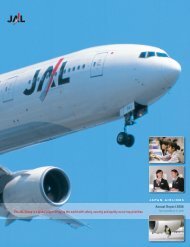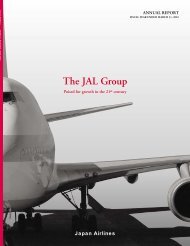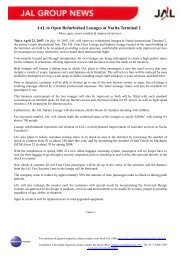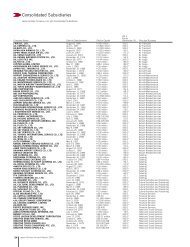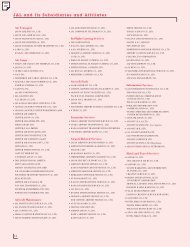Notice Regarding Revised Consolidated Financial Forecast (2 ...
Notice Regarding Revised Consolidated Financial Forecast (2 ...
Notice Regarding Revised Consolidated Financial Forecast (2 ...
Create successful ePaper yourself
Turn your PDF publications into a flip-book with our unique Google optimized e-Paper software.
November 7, 2008<br />
<strong>Notice</strong> <strong>Regarding</strong> <strong>Revised</strong> <strong>Consolidated</strong> <strong>Financial</strong> <strong>Forecast</strong><br />
JAL has revised its consolidated financial forecast for fiscal year 2008 ending March 31, 2009,<br />
as summarized below.<br />
1. Revisions of <strong>Consolidated</strong> <strong>Financial</strong> <strong>Forecast</strong> for the year ending March 31, 2009<br />
(April 1, 2008 to March 31, 2009)<br />
(Units:million yen, %)<br />
Operating Operating Ordinary<br />
Net Income<br />
Net Income<br />
Revenues Income Income<br />
Per Share<br />
Previous forecast(A) 2,184,000 50,000 30,000 13,000 2.45 yen<br />
<strong>Revised</strong> forecast(B) 2,093,000 28,000 5,000 13,000 2.45 yen<br />
Change in Amount(B-A) -91,000 -22,000 -25,000 0 -<br />
Change (%) (from A to B) -4.2 -44.0 -83.3 0.0 -<br />
Results in previous fiscal<br />
year(ended March 31,2008)<br />
2.Reasons for the revisions<br />
2,230,416 90,013 69,817 16,921 6.20 yen<br />
Since the start of the reporting period, tourist demand in international passenger operations weakened as a<br />
result of a deceleration of the global economy, triggered by the U.S. subprime mortgage loan crisis, and<br />
passengers flying for business purposes declined from summer onward. In our domestic passenger<br />
operations, performance results fell short of initial targets, due primarily to sluggish consumer spending,<br />
reflecting the slowdown in the economy in Japan, coupled with a further intensification in competition<br />
with Shinkansen bullet train services and the emergence of new rivals in the airlines business. As for the<br />
second-half period, we expect total operating revenues to continue to fall short of our initial target. The<br />
yen’s appreciation against the dollar and a reduction in the fuel surcharge on flights accompanying the<br />
recent decrease in the price of crude oil are expected to stimulate demand. However, these positive factors<br />
will fail to offset negative factors caused by a further slowdown in the economy, both in Japan and<br />
overseas.<br />
Operating costs were strongly affected by the surge in the unit cost of fuel. Fuel costs are likely to surpass<br />
our initial forecast on a full-term basis. However, thanks to our thorough implementation of cost-cutting<br />
measures, operating costs as a whole will decline to a level lower than initially estimated.<br />
As a result, total operating revenues are expected to decline ¥91.0 billion from our initial forecast, to<br />
¥2,093.0 billion. Operating income is expected to decrease ¥22.0 billion to ¥28.0 billion, and ordinary<br />
income to fall ¥25.0 billion to ¥5.0 billion, thanks in part to substantial reductions in operating costs.<br />
Extraordinary gain and losses are expected to improve from our initial estimate. Net income for the full<br />
term on a consolidated basis is thus forecast at ¥13.0 billion, unchanged from our original target.<br />
-1-
We have revised our full-term performance forecasts on a consolidated basis, assuming an average<br />
exchange rate of ¥106 to the U.S. dollar and a market price of US$90 per barrel for Singapore Kerosene<br />
for the second-half period.<br />
Note: Please be aware that the above forecasts are based on information available to the management of the<br />
Company as of the date of release, and that the actual figures may turn out to be significantly at variance with the<br />
forecasts, by reason of a wide variety of factors. The management targets and other forward-looking statements<br />
involve current assumptions of future events as well as risks and uncertainties that could significantly affect<br />
expected results, including, but not limited to, adverse economic or political conditions in Japan or other countries;<br />
increases in aviation fuel prices; negative changes in foreign exchange rates; terrorist attacks and military conflicts,<br />
and health epidemics.<br />
-2-


